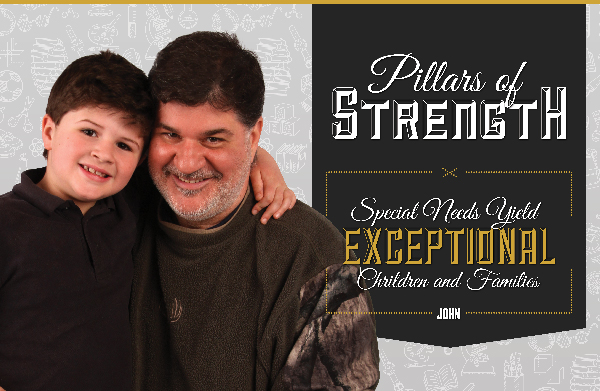
Special Needs Yield Exceptional Children and Families
In many ways, John is a normal kid. In fact, after spending just a few minutes with him, it becomes obvious that he is exceptionally bright. When you discover what a day in his life is like, you realize that he is dealing with everyday challenges on an entirely different level.
John is the only seven-year-old I know who does his own laundry, start to finish. He lives a life of structure that makes a parent’s draw drop. His interpretation of the world is in extreme literalism.
John’s challenge is autism.
Mom’s and Dad’s Story, in Mom’s Words
The Journey to John’s Diagnosis
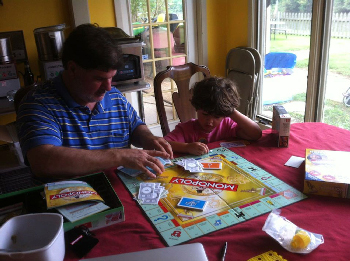 We were newly married and parents within a year. We were so overjoyed with the new blessing in our life that we did not see the signs for what they were. In retrospect, the signs were there beginning at 10 months.
We were newly married and parents within a year. We were so overjoyed with the new blessing in our life that we did not see the signs for what they were. In retrospect, the signs were there beginning at 10 months.
John was always smiling and happy or he was crying. He never napped. John would get in his jumpy and jump for hours, literally hours, and laugh. At the time, we thought it was cute. We learned later that this was due to his sensory issues. Motion kept him calm. Without language this was almost impossible to understand until later in the process.
John would take off running. He would not stop even if there was danger in front of him.
Our first instinct was to think he could not hear. We threw books and balls against the wall, screamed his name, and did everything we could to get his attention. We took him to get his hearing tested many times and it always checked out okay.
It was difficult to communicate because he had less than 15 words. We were not even sure he understood our questions.
Most children learn that if they cry, and they see their parents making formula and a bottle, that the outcome is being fed. John was not learning cause and effect. Taking John anywhere was almost impossible. He would scream and yell. Almost nothing would soothe him.
Any outing had to be with two people at all times. By now, we had discovered that the only thing that would calm John was looking at a screen or motion, or listening to music, which we would later discover to be a place of both comfort and obsession.
For John, it seemed to be a happy world at first, but soon it became very frustrating. John was alone.
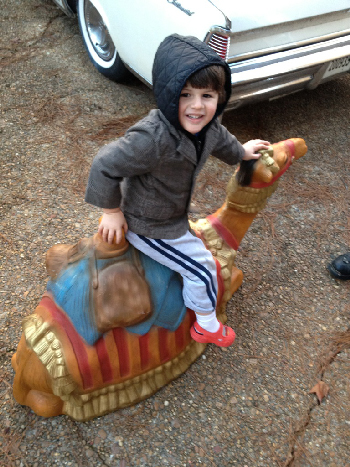 The 18-Month Checkup
The 18-Month Checkup
At age 18 months, I took him to his checkup. The doctor looked at him and said without a doubt he believed John to be autistic, which a neurologist would later confirm. He also said that John needed to visit a specialist for confirmation and start therapy, that early intervention was key.
Finally, we had a diagnosis.
The nurse told me there would not be an appointment to confirm the diagnosis for 12 months due to a lack of appointment availability in Mississippi. That was not acceptable. It was in that moment that somehow the entire thing turned. We were not going to listen or wait for results. We were going to make our own. We sought help out of state and, within a month, had an appointment, had a confirmed diagnosis, and were back in town with an early intervention plan of action.
We had to suppress all emotions as parents and be objective in order to give John a chance. Thick skin, planning, no negotiation, sacrifice, and a plan of action had to begin. Our approach was failure is not an option, no matter how many “out of the box” things we had to do.
Facing Autism
There are many theories on what causes autism.
How did he get it? Did we as parents do something?
We decided to not waste energy on the questions and just get to work. You cannot move forward if you are focusing on the “if.” The “if” will drain all energy.
There was a routine schedule, and nothing was going to get in the way. A therapist will give you three hours a week and suggestions to take home, but you have to do the work, and we did.
Life as we knew it came to a halt. All priorities changed. We managed finances, separate schedules, taking turns working nights, and taking only a few hours to nap. We made the time to work with John.
Friends, social outings, anything that got in the way of John had to stop unless time allowed. This lasted until he turned six.
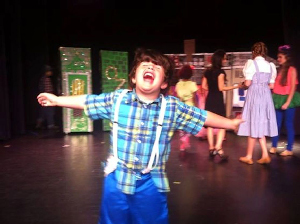 Taking the Reins
Taking the Reins
This is our job as parents. We did early intervention. If we did not do everything we could by age six, we would not be fair to John. We knew he was inside there. We just had to find him and show him how to come out and communicate. We believed every day was precious, especially during the developing years.
We turned our house into a therapy center and had more stuff than any clinic. We were relentless eight hours a day. Speech was a huge issue.
I played the movie Annie over and over again, and he watched the kids move their mouths. Over time he began to sing the songs from the movie. He was parroting. We moved to the Bumblebee series and worked on simple words. He never had words of his own. He was just repeating. But it was a start.
We traveled out of state for assistance. We tried many schools that could not keep him and some that would not try. We commuted out of state for one year for therapy. We had social classes with other kids. We practiced daily activities. We spent endless hours going to the park to have appropriate play, going to stores, going to the library, and going to Chuck E. Cheese’s.
We could not go on outings, to restaurants, or have a play date without playing alongside to make sure we were in a position to handle any triggers. We were unable to ease his frustration or bring him into our world. That was the hardest.
We put together a team of family members, godparents, friends, teenagers, teachers, non-licensed therapists, licensed therapists, neighbors, employees, friends, and even involved kind strangers.
Without the people around us, John would not be where he is today. We met many caring people along the way. At facilities that were not set up to handle John at the time, we met people who helped us personally, literally for years after.
It took constant talking and never ever leaving John alone. Every day and every hour we worked until we reached him and he came out a little more.
Sensory Issues
Sensory issues were one of the toughest things to grasp. As a younger child, he would not feel pain like other children, so we always had to watch him. He would stand in an ant bed and not feel pain or cry. He had obsessions with objects to lick or put in his mouth.
Over time he learned to cry if he hurt himself (It was a learned behavior, not a reaction). Over time he was able to curb obsessive behaviors. John is amazing in his progress, and it is HIS progress. He does the work to overcome.
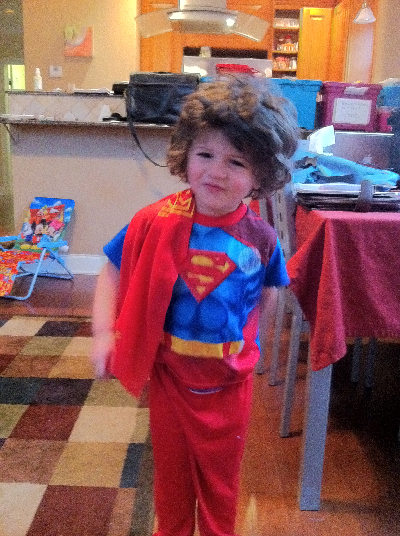 Language
Language
He is literal. You have to watch how you say things because the words you use may not match your meaning, and can result in disaster. We learned the hard way, many times, that you have to keep your word, even if the interpretation was not intended; especially if it involves a treat or reward.
When John’s language finally came, it suddenly exploded and came without a filter. He would say anything that came to his mind. We did not know how to temper him or to teach him.
His memory and vocabulary were very large. He was good at taking words he heard and repeating them, but often he did not understand most of what he was saying. If you did not know any better, you would think everything was okay, when it wasn’t. To this day, this is still a challenge.
John struggles with understanding humor. He has to learn what makes a joke, and how to take a joke. Ironically, understanding jokes and “getting them” has become one of John’s favorite activities. It turns out John loves humor.
As parents of an autistic child you can never lose your sense of humor.
An Active Mind
John’s many ideas fill his mind like bouncing balls. These abundant thoughts coupled with external stimulation overwhelm him and distract him, which lead to issues at school, at home, and with friends.
Our Approach, and Progress
We are always diligent. We never let John be comfortable in a routine or obsession.
We did not soothe John even if we had to endure screaming for hours and acting out behaviors. Breaking obsessions is a painful process.
For years, John refused to get in a shower or bath. He would scream out of fear from sensory issues. We installed an above ground swimming pool and used it for a bath. We eventually transitioned to a Jacuzzi, and then, over time, to a bathtub and shower, which he now handles on his own. In fact, John now finds the pool story hilarious.
To keep John from getting too comfortable in a routine, we would move his room and belongings every day. Then it turned into once a week. Then we progressed to every time he had a meltdown. Now his favorite thing to do is to rearrange his room with Mommy. It has taken years to get him to understand, but now he is starting to want to move things, and even donate things to charities.
John loves video games. They are an easy escape and easily develop into an obsession. We have to be especially careful with them and only use them as special treats so that he does not disappear into the world of electronics.
Routine Communication
If John is asked a question outright, he will avoid, distract, or outwit most adults. He is very tricky, very smart. He can recite or memorize anything he hears and use it in the correct context, but it does not mean he understands what he is saying.
How did we get John to open up? We had to be creative. We discovered that John likes to have board (family) meetings and call everyone to attention. We let him be in charge. We give him a pointer and chalkboard. This way he shares his feelings and questions.
To help keep things running smoothly we continue to work daily with positive feedback. We play “download your brain” where John tells us all kind of random thoughts and feelings and we try to interpret them, which calms him. We identify and deal with all of the “bouncing balls” one by one until they disappear. We strive to make it fun. This is a good way to help him to handle the overwhelming nature of his very active mind.
We have to continually remind him that it is okay to make a mistake.
Moving Forward
There have always been moments when I wished my child was like all others, especially in the very beginning years.
 We want John in a school that challenges him and accepts him without the special needs attached to his name. We want him to have a fighting chance. We prefer a school environment for the social aspect. If he cannot be part of a school setting, then he will be home schooled with many outside activities and exposure to all of the things he loves.
We want John in a school that challenges him and accepts him without the special needs attached to his name. We want him to have a fighting chance. We prefer a school environment for the social aspect. If he cannot be part of a school setting, then he will be home schooled with many outside activities and exposure to all of the things he loves.
It has taken years of work. At one time, John was a child who could not play with other kids. Now he can. Now, in most situations, he is able to communicate. He puts in earplugs when he gets overwhelmed. When he was younger, there was no reaching him when he got overwhelmed and had a “meltdown.” Now he is focused on self-control. He uses learned techniques to help control his emotions.
Many expect John to be tested and assessed as gifted, but we do not want him to have the added pressure of social differences. He puts enough pressure on himself.
We expect John to be respectful, behave, not be given pity, and not be labeled. We expect him to stand tall, be proud, and take charge of his life wherever it leads him. We expect John to continue to work hard and learn to control his behaviors that are due to sensory problems, fear, and lack of knowing what to do or how to react in a situation. We will be there, as parents, to support him all the way.
Every Day a Blessing
Every day is a miracle and fun — the good days and the bad days. John is exceptional in many areas, but the one thing that matters is that he is amazing. His compassion and empathy for others, and desire to make sure everyone is treated well, is remarkable. He truly does not understand why anyone would be mean. He wants everyone to feel love and have fun. John has developed a heart that is not tarnished by outside influences. He is truly concerned about all people.
An Amazing Family
Says John’s mother, “It is hard work and demands tremendous dedication. It requires countless hours. We worked it out so that I could dedicate myself nearly full time to our goals.” Says John’s father, “If we had just taken what the doctors had said and given in to our situation, we would not be in the situation we are in today. The fact that we are in school and John is leading a mostly normal, although challenged, life is amazing. We do not rest. We work hard every day.”
Above all, both parents encourage other parents to do what they do naturally for their children — everything in their power to do.
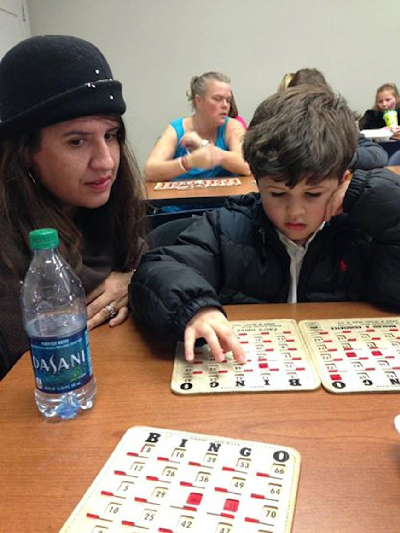 Take Away
Take Away
John’s parents are insistent that all parents cannot expect their results. They do not advocate their approach to others facing autism, and are even reluctant to share. They encourage parents to “assess their situation individually, do their research, and not be in denial of their circumstance. For it is difficult or impossible to help a child from a place of denial. Expect difficulties when dealing with insurance and finding resources. Don’t be unrealistic, but be positive! Don’t hang your hopes on the system. There are times when you have to make your own results. And, above all else, intervene immediately. Research shows that early intervention is key.”
Our lives are all made from different experiences, many of which must be experienced to be truly understood. Appreciating experiences from a distance is not at all the same. And, no matter how incredibly significant or impactful the experiences of others are, we are programmed to disassociate them from our daily awareness if they are not personal.
Compassion takes effort.
Facing challenges is part of living. The ability to take a bad situation and overcome it, and to do so in such a remarkable way as to see positives emerge, is one of the greatest gifts of living a life of free will.
Through their love, dedication, and pure tenacity, the entire family and John’s support team have helped John find the life he lives today. There are more challenges to come, many of them difficult and/or painful. All parents, children, and families face obstacles — some certainly greater than others.
Let those who face great challenges inspire us when we face great challenges of our own. Let them grant us perspective when our challenges are lesser. May we each be granted the wisdom to understand that the greatest challenge is also the reward — to appreciate the blessings we have been given and do everything in our power to make a difference.
Bryan Carter is an author, business owner, father, and husband. He lives in Ridgeland, Mississippi with his wife Shelley and two beloved children, Jack and Emma.